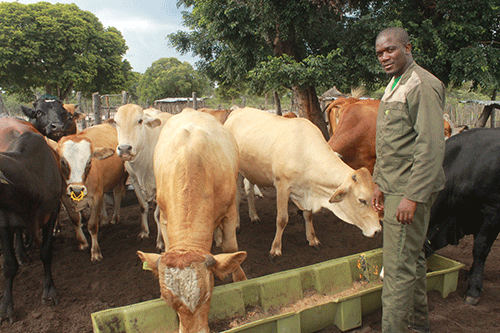SMALL KARUKUVISA – While many young Namibians don’t consider livestock farming as a business, a growing number of youngsters have shunned the notion of keeping cattle merely as a sign of wealth.
Kavango East sports officer Erastus Someno is one of the few young people farming with cattle and goats in the region as a business, and has employed two fellow young men to take care of his livestock and farm in the Mashare constituency.
The 35-year-old Someno, who started farming and building his farm at the age of 30 with only four cows, says it was an uphill battle in the beginning, but the odds have changed.
The hard work has started paying off.
“It was interest before I started. While studying in Cuba, during weekends and holidays, I would visit the current Namibian ambassador to Zimbabwe, Nicklaas Kandji, who was vice ambassador at our embassy in Cuba. When we would sit, he would tell me about his farming activities here in Namibia, and the benefits. That is when my interest in farming started,” said Someno, who recently shared his farming story with New Era.
“One time when I came home to Rundu on holiday, I discussed my farming interest with my mom, and asked her how we were going to get a farm. She applied through the traditional authority, and we got the farm. After graduating from Cuba, I came home, got a job and started to build the farm in 2016. It was tough; it was an uphill battle, but luckily I had an uncle, Vilho Hamutenya, who was there for me”, he narrated.
Someno now farms with Boer goats, a mixed breed of cattle as well as Simmental cattle.
His uncle Hamutenya also partly inspired him as he witnessed how cattle farming improved his life.
“I could see how he was reaping the benefits. So, after sharing my farming interest with him, he told me that before he could assist, I must first buy cattle. I bought four from him, and he got me four workers whom I hired to start with fencing off the farm and building my homestead,” he added.
“While fencing and developing the farm, I took in 14 goats. That was before I brought in the cattle. While stocking, I bought cattle from different farmers. When the goats came in, I didn’t have a borehole and used to fetch water from the next farm. Rhat was like six kilometres (km) away and a 12km round trip. I had an old Toyota Hilux which I used to fetch water with, and it pretty much did all the work at the farm.”
Someno later managed to drill a borehole to save his livestock from walking long distances to go and drink water at the nearest farm.
“When I started with farming, my lifestyle totally changed. It was difficult for me to try and balance work with farming, as you know I’m in charge of sports activities in the region. Most sports activities are held during weekends and long weekends, so it was tough for me because during the week, I was at work, and weekends when I’m supposed to attend to the farm, there are sports activities,” he noted.
“At times, I would drive to the farm during the night, just to go and fetch water for my workers and goats. That was before I drilled a borehole. It was really tough because when I started this journey, I used cash from my own pocket. I didn’t have livestock to sell because I was starting.”
Someno said farming is indeed a positive business.
“When I started stocking, my uncle helped me to get a top-quality Simmental bull, which has brought in great benefits. Many farmers from the two Kavango regions started demanding bulls from me, even farmers who started farming long before me. The bulls, which were fathered by my bull, were of a good breed and were selling better than heifers and oxen. To date, I sold about eight bulls. A bull can go for N$30 000”, he explained.
The determined Someno said financially, it was heavy on his pocket when he began, and maintaining his cattle and goats was tough.
“Maintenance goes deep into your pockets; vaccines are expensive, and so are all livestock medications. When I started, some fellow youths used to say I was engaging in old people’s activities, and that I was investing in something that will not be giving me returns any time soon.
But what I have learned is that the moment you take care of your livestock properly and you start selling, you will make a killing, and you will have money to invest back into your farming activities. You will have resources to improve your livestock farming. It is guaranteed that you will get everything that you invested in with profits,” he beamed.
Someno advised fellow young people to engage more into agricultural activities because with the increasing food prices, the youth should see this as an opportunity to make money and create employment.
“You can have your gardens, goats here and cattle there, and you will make business and earn a living. For the sake of food security in the country, we should engage more into farming. Every day, we have to eat, and we buy meat, milk and vegetables in supermarkets that all come from farms outside the country. Let’s tap into agriculture to feed our people, and government should assist us in getting our produce into the market,” he stated.


